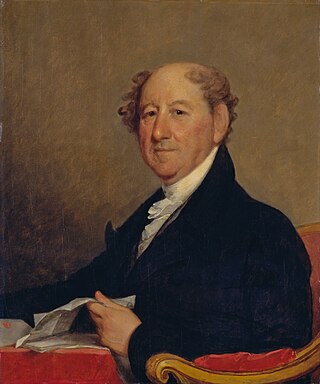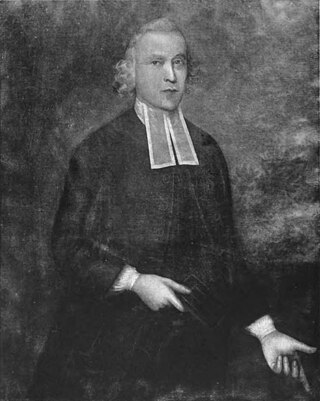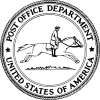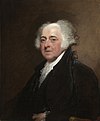In 1799 Fort Pickering in Salem, Massachusetts was named for him. [18]
In 1942, a United States Liberty ship named the SS Timothy Pickering was launched. She was lost off Sicily in 1943.
Until the 1990s, Pickering's ancestral home, the circa 1651 Pickering House, was the oldest house in the United States to be owned by the same family continually.
See also
Related Research Articles

James Monroe was a Founding Father of the United States, and served as the fifth president of the United States from 1817 to 1825. He was the last Founding Father to serve as president as well as the last president of the Virginia dynasty. He was a member of the Democratic-Republican Party, and his presidency coincided with the Era of Good Feelings, concluding the First Party System era of American politics. He issued the Monroe Doctrine, a policy of limiting European colonialism in the Americas. Monroe previously served as governor of Virginia, a member of the United States Senate, U.S. ambassador to France and Britain, the seventh secretary of state, and the eighth secretary of war.

The Federalist Party was a conservative and nationalist American political party and the first political party in the United States. It dominated the national government under Alexander Hamilton from 1789 to 1801. The party was defeated by the Democratic-Republican Party in 1800, and it became a minority party while keeping its stronghold in New England. It made a brief resurgence by opposing the War of 1812, then collapsed with its last presidential candidate in 1816. Remnants lasted for a few years afterwards.

The 1792 presidential election were held in the United States from November 2 to December 5, 1792. Incumbent President George Washington was elected to a second term by a unanimous vote in the electoral college, while John Adams was reelected as vice president. Washington was essentially unopposed, but Adams faced a competitive re-election against Governor George Clinton of New York.

George Clinton was an American soldier, statesman, and a prominent Democratic-Republican in the formative years of the United States of America. Clinton served as the fourth vice president of the United States from 1805 until his death in 1812. He also served as the first governor of New York from 1777 to 1795 and again from 1801 to 1804. Along with John C. Calhoun, he is one of two vice presidents to hold office under two consecutive presidents. He was also the first vice-president to die in office.

Fisher Ames was a Representative in the United States Congress from the 1st Congressional District of Massachusetts. He was an important leader of the Federalist Party in the House, and was noted for his oratorical skill.

Rufus King was an American Founding Father, lawyer, politician, and diplomat. He was a delegate from Massachusetts to the Continental Congress and the Philadelphia Convention and was one of the signers of the United States Constitution in 1787. After formation of the new Congress, he represented New York in the United States Senate. He emerged as a leading member of the Federalist Party and was the party's last presidential nominee during the 1816 presidential election.

James McHenry was a Scotch-Irish American military surgeon, statesman, and a Founding Father of the United States. McHenry was a signer of the United States Constitution from Maryland, initiated the recommendation for Congress to form the Navy, and was the eponym of Fort McHenry. He represented Maryland in the Continental Congress. He was a delegate to the Maryland State Convention of 1788, to vote whether Maryland should ratify the proposed Constitution of the United States. He served as United States Secretary of War from 1796 to 1800, bridging the administrations of George Washington and John Adams. At the time of his death, McHenry owned 10 slaves, most of whom either worked as household servants or maintained his estate.

Samuel Dexter was an early American statesman who served both in Congress and in the Presidential Cabinets of John Adams and Thomas Jefferson. A native of Boston, Massachusetts, Dexter was a 1781 graduate of Harvard College. After receiving his degree he studied law, attained admission to the bar in 1784, and began to practice in Lunenburg, Massachusetts.

William Eustis was an early American physician, politician, and statesman from Massachusetts. Trained in medicine, he served as a military surgeon during the American Revolutionary War, notably at the Battle of Bunker Hill. He resumed medical practice after the war, but soon entered politics.

George Cabot was an American merchant, seaman, and politician from Massachusetts. He represented Massachusetts in the U.S. Senate and was the presiding officer of the infamous Hartford Convention.

Jacob Crowninshield was a U.S. Representative from Massachusetts and appointee to the position of U.S. Secretary of the Navy, which he never filled. His brother Benjamin Williams Crowninshield did successfully hold the post; the Crowninshield family in general was prominent in early American maritime affairs. He was the grandfather of Arent S. Crowninshield.

The presidency of John Adams, began on March 4, 1797, when John Adams was inaugurated as the second president of the United States, and ended on March 4, 1801. Adams, who had served as vice president under George Washington, took office as president after winning the 1796 presidential election. The only member of the Federalist Party to ever serve as president, his presidency ended after a single term following his defeat in the 1800 presidential election. He was succeeded by Thomas Jefferson of the opposition Democratic-Republican Party.

Charles Wentworth Upham was a U.S. Representative from Massachusetts. Upham was also a member, and President of the Massachusetts State Senate, the 7th Mayor of Salem, Massachusetts, and twice a member of the Massachusetts State House of Representatives. Upham was the cousin of George Baxter Upham and Jabez Upham. Upham was later a historian of Salem and the Salem Witch Trials of 1692 when he lived there.

John Adams was an American Founding Father who served as the second president of the United States from 1797 to 1801. Before his presidency, he was a leader of the American Revolution that achieved independence from Great Britain. During the latter part of the Revolutionary War and in the early years of the new nation, he served the U.S. government as a senior diplomat in Europe. Adams was the first person to hold the office of vice president of the United States, serving from 1789 to 1797. He was a dedicated diarist and regularly corresponded with important contemporaries, including his wife and adviser Abigail Adams and his friend and political rival Thomas Jefferson.

Benjamin Pickman Jr. was a U.S. Representative from Massachusetts.

The Federalist Era in American history ran from 1788 to 1800, a time when the Federalist Party and its predecessors were dominant in American politics. During this period, Federalists generally controlled Congress and enjoyed the support of President George Washington and President John Adams. The era saw the creation of a new, stronger federal government under the United States Constitution, a deepening of support for nationalism, and diminished fears of tyranny by a central government. The era began with the ratification of the United States Constitution and ended with the Democratic-Republican Party's victory in the 1800 elections.

Rev. Dudley Leavitt (1720–1762) was a Congregational minister born in New Hampshire, educated at Harvard College, who led a splinter group from the First Church in Salem, Massachusetts, during a wave of religious ferment nearly a decade before the Great Awakening. Following Leavitt's death at age 42, his congregation elected to christen itself 'The Church of Which the Rev. Dudley Leavitt was late Pastor' after the charismatic preacher. Leavitt Street in Salem is named for the early minister.

Dudley Leavitt Pickman (1779–1846) was an American merchant who built one of the great trading firms in Salem, Massachusetts, during the seaport's ascendancy as a trading power in the late eighteenth and early nineteenth centuries. Pickman was a partner in the firm Devereux, Pickman & Silsbee and a state senator. Among the wealthiest Salem merchants of his day, Pickman used his own clipper ships to trade with the Far East in an array of goods ranging from indigo and coffee to pepper and spices, and was one of the state's earliest financiers, backing everything from cotton and woolen mills to railroads to water-generated power plants. Pickman also helped found what is today's Peabody Essex Museum.

Joseph Dennie was an American author and journalist who was one of the foremost men of letters of the Federalist Era. A Federalist, Dennie is best remembered for his series of essays entitled The Lay Preacher and as the founding editor of The Port Folio, a journal espousing classical republican values. Port Folio was the most highly regarded and successful literary publication of its time, and the first important political and literary journal in the United States. Timothy Dwight IV once referred to Dennie as "the Addison of America" and "the father of American Belles-Lettres."
Events from the year 1795 in the United States.
References
- ↑ "APS Member History". search.amphilsoc.org. Retrieved March 31, 2021.
- ↑ Clarfield. Timothy Pickering and the American Republic p.246
- ↑ Mary Pickering, sister of Timothy, was married to Salem Congregational minister Dudley Leavitt, for whom Salem's Leavitt Street is named. A Harvard-educated native of Stratham, New Hampshire, Leavitt died an untimely death in 1762 at age 42. Mary Pickering Leavitt remarried Nathaniel Peaselee Sargeant of Haverhill, Justice of the Supreme Judicial Court of Massachusetts. Mary Pickering's daughter Elizabeth Pickering Leavitt married Salem merchant William Pickman.
- ↑ The Diary of William Bentley, D.D., Pastor of the East Church, Salem, Massachusetts, 4 vols. (Gloucester, Mass.: Smith, 1962), 3:352.
- ↑ Octavius Pickering and Charles W. Upham, The Life of Timothy Pickering, 4 vols. (Boston: Little Brown, 1867–73), 1:7–15, 31.
- ↑ Pickering and Upham, Life of Timothy Pickering, 1:85.
- ↑ Garry Wills (2003). "Before 1800" . Negro President: Jefferson and the Slave Power. Houghton Mifflin Company. pp. 20–21. ISBN 0-618-34398-9.
- ↑ Pickering and Upham, Life of Timothy Pickering, 1:34–139, 251–522; 2:69–508; Gerard H. Clarfield, Timothy Pickering and the American Republic (Pittsburgh: University of Pittsburgh Press, 1980), 47–144; Edward Hake Phillips, "Salem, Timothy Pickering, and the American Revolution," Essex Institute Historical Collections 111, 1 (1975): 65–78; David McLean, Timothy Pickering and the Age of the American Revolution (New York: Arno Press, 1982).
- ↑ Pickering and Upham, Life of Timothy Pickering, 1:532–35; 2:140–73, 182–325, 369–445; Clarfield, Pickering and the Republic, 85–115; Jeffrey Paul Brown, "Timothy Pickering and the Northwest Territory," Northwest Ohio Quarterly 53, 4 (1982): 117–32.
- ↑ Clapp, William Warland (1880). Joseph Dennie: Editor of "The Port Folio," and author of "The Lay Preacher.". John Wilson and Son. p. 32.
- ↑ Massachusetts Historical Society (1896), pp.463 & 562.
- ↑ Adams, Henry (1986). History of the United States of America during the administrations of Thomas Jefferson. New York: Literary Classics of the United States. pp. 409, 428. ISBN 0940450348.
- ↑ Clarfield. Timothy Pickering and the American Republic p.246-247
- ↑ Adams, Henry (1893). History of the United States of America: The second administration of Thomas Jefferson, 1805-1809. C. Scribner's. pp. 402–404.
- ↑ McDonald,1976, pp. 147–148
- ↑ "U.S. Senate: Expulsion and Censure". www.senate.gov. Retrieved October 11, 2015.
- ↑ "Book of Members, 1780–2010: Chapter P" (PDF). American Academy of Arts and Sciences. Retrieved July 28, 2014.
- ↑ Roberts, Robert B. (1988). Encyclopedia of Historic Forts: The Military, Pioneer, and Trading Posts of the United States. New York: Macmillan. pp. 407–408. ISBN 0-02-926880-X.
Further reading
- United States Congress. "Timothy Pickering (id: P000324)". Biographical Directory of the United States Congress .
- Almog, Asaf. “Looking Backward in a New Republic: Conservative New Englanders and American Nationalism, 1793-1833.” Ph.D. diss, University of Virginia, 2020.
- Clarfield, Gerard H. "Postscript to the Jay Treaty: Timothy Pickering and Anglo-American Relations, 1795–1797," William and Mary Quarterly 3d ser., 23, 1 (1966): 106–20.
- Clarfield, Gerard H. Timothy Pickering and American Diplomacy, 1795–1800. Columbia: University of Missouri Press, 1969.
- Clarfield, Gerard. Timothy Pickering and the American Republic. Pittsburgh: University of Pittsburgh Press, 1980.
- Clarfield, Gerard H. "Timothy Pickering and French Diplomacy, 1795–1796." Essex Institute Historical Collections 104, 1 (1965): 58–74.
- Clarfield, Gerard H. "Victory in the West: A Study of the Role of Timothy Pickering in the Successful Consummation of Pinckney's Treaty," Essex Institute Historical Collections 101, 4 (1965): 333–53.
- Garraty, John A. and Mark C. Carnes. American National Biography, vol. 17, "Pickering, Timothy". New York: Oxford University Press, 1999.
- Guidorizzi, Richard Peter. "Timothy Pickering: Opposition Politics in the Early Years of the Republic" Ph.D. diss, St. John's University, 1968.
- Hickey, Donald R. "Timothy Pickering and the Haitian Slave Revolt: A Letter to Thomas Jefferson in 1806," Essex Institute Historical Collections 120, 3 (1984): 149–63. Note: hyperlink is going to an early access non-authoritative version available on Founders Online. The letter is also available on Internet Archive as archived on December 31, 2019. To Thomas Jefferson from Timothy Pickering, 24 February 1806.
- Massachusetts Historical Society (1896) Historical Index to the Pickering Papers. (The Society).
- McCurdy, John Gilbert. "'Your Affectionate Brother': Complementary Manhoods in the Letters of John and Timothy Pickering." Early American Studies 4, 2 (Fall 2006): 512–545.
- McLean, David. Timothy Pickering and the Age of the American Revolution. New York: Arno Press, 1982.
- Pickering, Octavius, and Charles W. Upham. The Life of Timothy Pickering. 4 vols. Boston: Little Brown, 1867–73.
- Phillips, Edward Hake. "The Public Career of Timothy Pickering, Federalist, 1745–1802." Ph.D. diss, Harvard University, 1952.
- Phillips, Edward Hake. "Salem, Timothy Pickering, and the American Revolution." Essex Institute Historical Collections 111, 1 (1975): 65–78.
- Phillips, Edward Hake. "Timothy Pickering at His Best: Indian Commissioner, 1790–1794." Essex Institute Historical Collections 102, 3 (1966): 163–202.
- Prentiss, Harvey Pittman. Timothy Pickering as the Leader of New England Federalism, 1800–1815. New York: DaCapo Press, 1972.
- Wilbur, William Allan. "Crisis in Leadership: Alexander Hamilton, Timothy Pickering and the Politics of Federalism, 1795–1804." Ph.D. diss, Syracuse University, 1969.
- Wilbur, W. Allan. "Timothy Pickering: Federalist, Politician, An Historical Perspective," Historian 34, 2 (1972): 278–92.
- Wilentz, Sean "The Rise of American Democracy: Jefferson to Lincoln" W.W. Norton. New York. 2005.
External links
- United States Congress. "Timothy Pickering (id: P000324)". Biographical Directory of the United States Congress .
- Biography and portrait at Quartermaster-Generals
- Timothy Pickering at Find a Grave
Timothy Pickering | |
|---|---|
 Portrait by Charles Willson Peale, 1792 | |
| 3rd United States Secretary of State | |
| In office December 10, 1795 –May 12, 1800 Ad interim: August 20 – December 10, 1795 |








